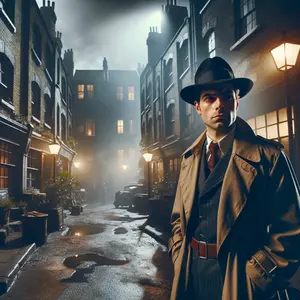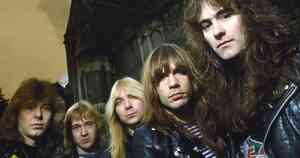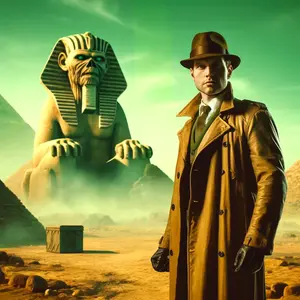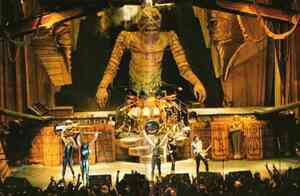Antonio, can you tell us about the exact moment when you developed a passion for writing and especially why you felt the need to put your thoughts on paper?
“It all started when, at the age of five, even before going to school, my mother taught me to read and write. Since then, paper and pen have always been faithful companions, and I poured anything that crossed my mind into words, sentences, and thoughts. It was like discovering a new world, a secret language through which I could express anything that was in my mind. Writing soon became a form of play, but also a way to explore and understand the world around me.![]() Each blank page represented an adventure waiting to be lived, each word a piece of a larger mosaic.
Each blank page represented an adventure waiting to be lived, each word a piece of a larger mosaic.
The need to put my thoughts on paper arose from an inner need to give shape and order to my emotions and ideas. Writing allowed me to have a dialogue with myself, to reflect, to analyze situations with greater clarity. It was a safe refuge where I could be myself without filters, a place of intimacy and introspection. Back then, we didn’t have email or chat: I wrote letters to everyone: to summer friends during the long winters that separated us, to the girls I liked, to my closest friends to express feelings and, in a sense, to sign them forever.
Soon, this practice became a real passion. Writing has accompanied me through all the stages of my life, evolving with me. It has been an anchor in difficult moments and a companion in times of joy. It has allowed me to explore new worlds, initially expressed through poetry and then to bring characters and stories to life, sharing my way of seeing the world with others. In summary, my passion for writing was born from the magic of a moment shared with my mother and has been nurtured by my curiosity and desire to communicate. It is an integral part of who I am and will always continue to be.”
How did the idea for “Eddie must die” come about and what emotions did it evoke in you?
“The idea of writing a novel came from the desire to challenge myself with something ‘tough,’ something that would push me beyond my creative limits. The genesis of the novel was influenced by several passions I have cultivated for a long time: my devotion to Iron Maiden, with their imagery rich in symbolism and dark narrative, and my love for thriller-police stories, dense with mystery and tension. The plot began to take shape while I was immersed in reading an English biography of Iron Maiden, from which I learned that the band was contested in the United States because of “The Number of the Beast,” mistakenly considered a satanic album. A Catholic group even organized demonstrations outside the arenas where they performed, burning records and inviting people not to enter. That’s when I wondered: “What if someone wanted to go beyond protests and eliminate the band at all costs?” This thought fascinated me, and I couldn’t ignore it. It was as if my mind was telling a story that I absolutely had to write.
The emotions that accompanied me during the writing of the novel were intense and varied. At the beginning, there was the enthusiasm and adrenaline of exploring a new narrative territory, but also a bit of fear about being able to do justice to such an ambitious idea. As the writing progressed, I was overwhelmed by a sense of continuous challenge: each chapter was a puzzle to solve, each character a nuance to deepen. Furthermore, writing “Eddie must die” allowed me to combine two seemingly distant worlds but incredibly akin in my mind. On one side, the musical universe of Iron Maiden, with their musical aesthetics and always stimulating themes, and on the other, the intrigue and suspense typical of police thrillers. This combination created a ‘perfect storm’ of creativity, pushing me to explore new dimensions of storytelling and to maintain a tight and engaging rhythm. In short, creating this novel was an exciting journey, full of moments of pure inspiration and stimulating challenges. It allowed me to grow as a writer and to immerse myself deeply in my passions, giving life to a story that I hope can captivate and surprise readers as much as it captivated and surprised me in the writing process.”
The novel is set in London in 1982, why this choice and how has London changed from the past to the present?
“The choice of period was somehow dictated by the plot itself. The release of Iron Maiden’s “The Number of the Beast” album, which took place in 1982, is the catalyst event that triggers the whole series of events in the novel. This historical context is essential not only for the chronology of events but also for the atmosphere I wanted to recreate. In 1982, the outskirts of London were often characterized by decay and abandonment. The United Kingdom was going through a period of economic crisis, with high unemployment rates and palpable social tensions. The streets were frequented by young people without jobs, and daily life was marked by difficulties and uncertainties. This environment provided a perfect backdrop for my story, where the darkness and desolation of the suburbs mirrored the inner turmoil of the characters.  Of course, living close to the British capital, being able to conduct my research in person in the novel’s locations, and being able to talk to people greatly facilitated my work.
Of course, living close to the British capital, being able to conduct my research in person in the novel’s locations, and being able to talk to people greatly facilitated my work.
Today, London is a completely different city. It is incredible to think about how much it has changed in a few decades. The British capital has undergone extensive urban redevelopment, transforming old buildings and run-down areas into modern and vibrant neighborhoods. Many of the suburbs that were once synonymous with hardship and abandonment are now elegant and affluent residential areas, with modern infrastructure and excellent services. This transformation has made London one of the most dynamic and advanced cities in the world. The city has become a melting pot of cultures and innovation, a place where history and modernity coexist in harmony. However, while today’s London is sparkling and full of opportunities, the London of 1982 remains a fascinating and unforgettable part of its history, a period that helped shape the city’s current identity. Setting the novel in that precise historical moment allowed me to explore these dynamics, to create a contrast between the past and the present, and to offer readers a glimpse of a London that many might have forgotten or never known. It was fascinating to immerse myself in that era and bring it to life through storytelling, highlighting how circumstances and the environment can profoundly influence the stories and lives of people.”

The book emphasizes music, one of its key elements. What is your relationship with music, and why this choice?
“Music, especially heavy metal, has always been a fundamental part of my life. Although I never had ambitions to become a musician, I have always been a great enthusiast and consumer of music. Notes and melodies have accompanied me through many moments of my life, serving as the soundtrack to my experiences and deeply inspiring my creative process. The novel also stems from the desire to pay homage to Iron Maiden, a band that has had a significant impact on my life. Their songs, with their epic stories and powerful sound, have always fascinated me and have become an inexhaustible source of inspiration. For me, Iron Maiden represents not just a musical band, but a constant point of reference, a presence that has accompanied me since I was a teenager.
Iron Maiden represents not just a musical band, but a constant point of reference, a presence that has accompanied me since I was a teenager.
The choice to incorporate heavy metal music into the novel was natural and almost inevitable. I wanted to create a work that reflected my passions and that could convey to the reader the energy and emotion I feel every time I listen to one of their songs. However, I was always mindful that my goal was also to make the story accessible and engaging for everyone, regardless of their familiarity with the musical genre or the band itself. I am happy to say that this approach has been successful. Many readers who didn’t even know about the existence of Iron Maiden have enjoyed the novel, leaving very positive reviews. This demonstrates that, although music is a central element, the heart of the story lies in the characters, their events, and the universal themes that are addressed. Music thus becomes a vehicle for expressing emotions and creating atmosphere, but it does not prevent those who are not heavy metal enthusiasts from fully enjoying the reading experience. In conclusion, my relationship with music is deep and passionate, and I wanted this to shine through in my novel. I hope that, through the pages of “Eddie must die,” readers can not only immerse themselves in a captivating story but also get closer to the world of music that I love so much, perhaps discovering new sounds and new emotions.”
Another key theme is religion. Why did you decide to address this particular topic?
“To create a good crime thriller, strong and motivated antagonists were necessary. Religion, with its ability to inspire both good and evil, seemed to me to be fertile ground for exploring these dynamics. The decision to address the religious theme arises from the desire to give depth and complexity to the narrative, inserting elements that could challenge readers to reflect on broader and more universal issues. I also wanted to show that extremism can be found in all religions, not just in Islam, as is often presented in American films. It’s a cliché that limits the understanding of the true dynamics of extremism and radicalization. Religion, in all its forms, can become a powerful tool in the hands of those who seek to manipulate the masses for personal or ideological ends. Showing this aspect allowed me to move away from stereotypical narratives and offer a more balanced and realistic perspective.
Addressing this theme allowed me to explore the ambivalence of faith: on one hand, a force that can provide hope, comfort, and moral guidance; on the other, a potential source of conflict and division when manipulated. This dualism provided a rich substrate for developing complex and nuanced characters, each with their own motivations and deep convictions. Additionally, through the story, I wanted to highlight how extremism is not limited to a single culture or faith, but can emerge wherever there are individuals willing to interpret religious precepts in a radical way. This approach aims to challenge readers to look beyond simplifications and understand that fanaticism is a human issue, not exclusively linked to a particular religion or culture.
I hope that readers can appreciate this complexity and find in the story not only entertainment but also food for thought on important and current themes.”
Do you have any other writing plans? If so, in what genre and on what theme?
“I have several projects in the pipeline, many of which continue to explore the police thriller genre that I love so much. This genre allows me to create gripping and intricate stories, full of suspense and twists, that keep readers on the edge of their seats until the last page. However, I am also working on some historical fiction projects, another field that fascinates me deeply, because it offers me the opportunity to immerse myself in past eras, to explore different social and cultural contexts, and to bring to light forgotten or lesser-known stories. There is something magical about being able to transport readers to another time, making them live through the eyes of characters who face universal challenges and dilemmas but in specific historical contexts. One of my goals is to write a book that can combine thriller elements with a historical setting, creating a sort of hybrid that captures the essence of both genres. I imagine dense plots of intrigue and mystery, set in significant historical periods, where protagonists must solve puzzles that intertwine the past with the present.
I am curious to see which will be the first ‘non-Iron Maiden’ book to see the light! Every project I develop is a new challenge and an opportunity to grow as a writer and as a person. Regardless of the genre, I always strive to create stories that are engaging, well-structured, and rich in emotions. Writing is a continuous journey, and I am excited to see where my next ideas will take me. I will continue to explore the genres I love, always seeking to offer readers unforgettable narrative experiences. I hope to share my next work with you soon, whether it’s a breath-taking police thriller or a fascinating historical adventure.”



